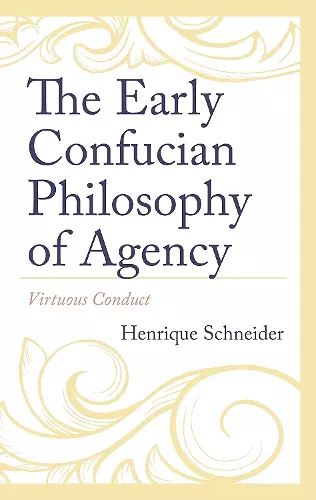The Early Confucian Philosophy of Agency
Virtuous Conduct
Format:Hardback
Publisher:Lexington Books
Published:15th Feb '24
Currently unavailable, and unfortunately no date known when it will be back

Henrique Schneider argues that understanding the three Early Confucian thinkers—Confucius, Mencius, and Xunzi—as virtue-ethicists, political philosophers, or social conservatives proves too narrow. Championing a broader and more philosophical reading, The Early Confucian Philosophy of Agency: Virtuous Conduct sheds new light on a well-established topic. Virtuous conduct—aligning actions and motivations with virtues, social roles, and rituals—is the philosophy of agency of Early Confucianism. Confucius, Mencius, and Xunzi share a common philosophy of agency, which does more than describe agents and acts: it also represents a progressive social and political program. Schneider characterizes Early Confucianism as a progressive philosophy due to its human-centered program for social reform, its process view of self-cultivation, and its development. Agents who cultivate themselves can produce virtuous conduct, flourish, and become Junzi. This lets them lead each other in self-cultivation, social environment, and polity. As such, virtuous conduct integrates ethics, social and political philosophy in a theory of action.
While not denying or ignoring their differences, Henrique Schneider argues that the philosophies of Kongzi, Mengzi, and Xunzi present a family resemblance promoting a synthetic philosophy centrally concerned with personal, social, and political agency. This conception of agency is analyzed in terms of virtues, roles, and rituals, linking agents with various types of conduct aimed at cultivating human nature and producing individual and collective flourishing. At the center of his account is a description of an ideal agent, the Junzi, “a self-interested, righteous, self-cultivating leader of familial, social, and political affairs” who not only represents a personal ideal but an inspiring, socially efficacious exemplar. This clear, concise, and original analysis of early Confucian thought will be appreciated by philosophers, political theorists, educators, social scientists, policy makers, and anyone interested in Chinese thought and culture.
-- Philip Ivanhoe, Georgetown UniversityWhile many recent treatments of early Confucianism have focused on the differences between Kongzi, Mengzi, and Xunzi, Henrique Schneider uncovers a significant overlap of commonality between these thinkers. Schneider sees an underlying family resemblance in the thinking of the early Confucians that unifies their normative outlooks on virtues, roles, and rituals. A popular and active approach in contemporary philosophy investigates agency, action, and normativity, and Schneider looks to these aspects to find the overlapping features of thought in Kongzi, Mengzi, and Xunzi. By concentrating on the common outlook of human agency, Schneider persuades his readers to join him in seeing the complementary, triangular relationship of virtue, roles, and rituals that constitute virtuous conduct in early Confucian thought. In doing so, Schneider offers an innovative contribution to studies of early Confucianism that pertains to both moral philosophy and social-political philosophy.
-- Gordon B. Mower, Brigham Young UniversityUnlike many examinations of early Confucianism, Henrique Schneider does not pick a single idea from among rituals, roles, and virtues and then work to understand the other two in terms of the first. Rather, he offers valuable insights into Kongzi, Mengzi, and Xunzi by examining what these thinkers share. Schneider draws out important differences in these philosophers’ understanding of the content of these fundamental concepts, how they relate to one another, and what they reveal about an underlying theory of action.
-- Eirik Lang Harris, Colorado State UniverISBN: 9781666928372
Dimensions: 236mm x 159mm x 20mm
Weight: 449g
188 pages